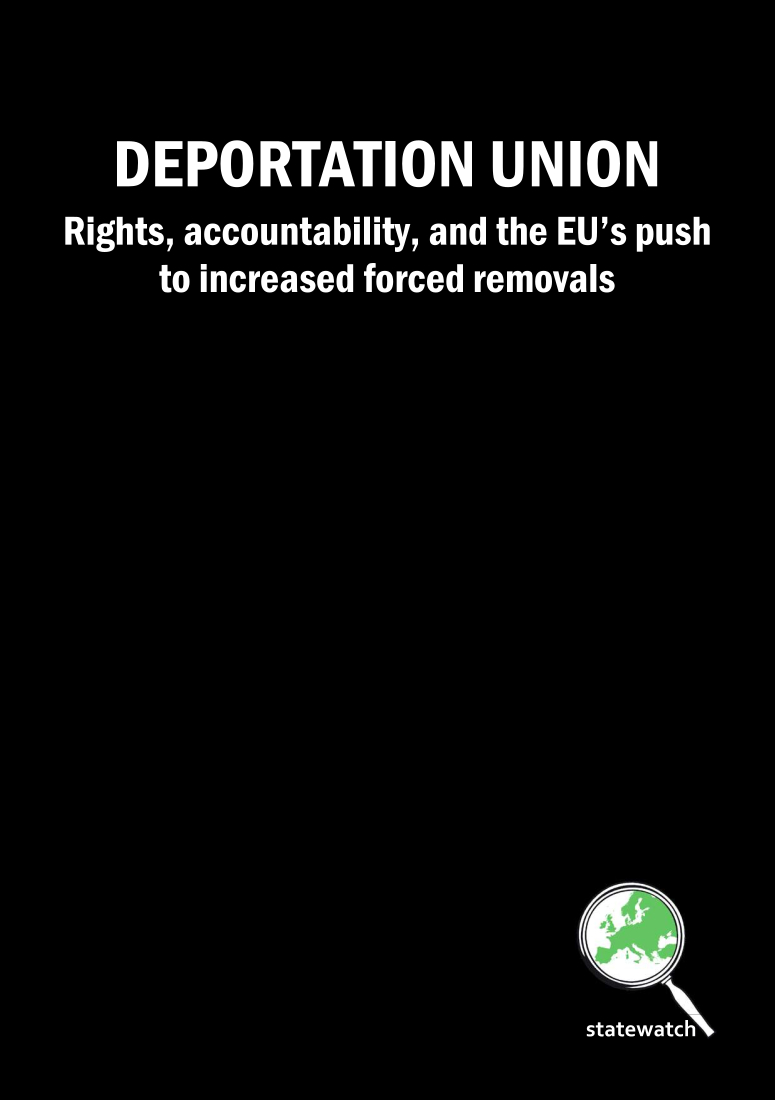Deportation Union: Rights, accountability and the EU's push to increase forced removals
Deportation Union provides a critical examination of recently-introduced and forthcoming EU measures designed to increase the number of deportations carried out by national authorities and the European Border and Coast Guard Agency, Frontex. It focuses on three key areas: attempts to reduce or eliminate rights and protections in the law governing deportations; the expansion and interconnection of EU databases and information systems; and the increased budget, powers and personnel awarded to Frontex.
There has long-been coordinated policy, legal and operational action on migration at EU level, and efforts to increase deportations have always been a part of this. However, since the ‘migration crisis’ of 2015 there has been a rapid increase in new initiatives, the overall aim of which is to limit legal protections afforded to ‘deportable’ individuals at the same time as expanding the ability of national and EU authorities to track, detain and remove people with increasing efficiency.
The measures and initiatives being introduced by the EU to scale up deportations will require massive public expenditure on technology, infrastructure and personnel; the strengthening and expansion of state and supranational agencies already-lacking in transparency and democratic accountability; and are likely to further undermine claims that the EU occupies the moral high ground in its treatment of migrants. Anyone wishing to question and challenge these developments will first need to understand them. This report attempts to go some way towards assisting with that task.
Infographic
For a quick overview of the report, see the infographic: How the EU is building a 'deportation machine'
Press release
Read the press release here: EU’s planned ‘deportation machine’: expensive, dangerous and lacking in transparency and accountability measures
Full-text of the report
The report is available as a PDF here, or you can read it online - navigate using the menu on the left or click here for the contents.
Data
The dataset used to analyse removal operations coordinated and funded by Frontex is available here: Deportation Union - Data.xlsx (53.3MB)
Webinars
We are hosting a series of webinars to explain and explore the report and the issues it raises.
26 October: Databases for expulsions
The EU is expanding a host of databases used for migration and border control. New systems are being developed to ensure the biometric registration of almost all non-EU nationals in the Schengen area. Under the moniker of “interoperability”, the data held in these systems is being interconnected and used in new and controversial ways. Frontex has been given an increasing role in the design and operation of databases used to facilitate expulsions.
Sign up here.
Read the report here.
28 September: Revamped return policies and reckless forced removals
The first of these was held on 28 September and focused on the EU's Return Directive, a 2008 law governing standards and procedures for forced removals from the EU, and ongoing proposals to redraft the law. You can view a recording of the webinar here and read the relevant section of the report here.
Sign up to our mailing list to receive updates about upcoming events and other announcements from us, as well as our fortnightly newsletter.
Deportation Union: Rights, accountability and the EU's push to increase forced removals
- Credits and publication information
- Contents
- Tables, figures and abbreviations and acronyms
- Executive summary
- Introduction
- Deportations at the heart of EU migration policy
- Frontex: the EU’s ‘deportation machine’
- Conclusions
Spotted an error? If you've spotted a problem with this page, just click once to let us know.
